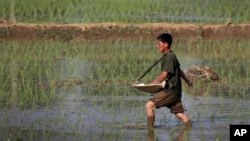This month marks the 75th anniversary of the adoption of the Universal Declaration of Human Rights, one of the most influential documents in modern history. Less widely known is the fact that this year also saw the 10th anniversary of the creation of the UN Commission of Inquiry on Human Rights in the DPRK, or North Korea. In its reports, this Commission concluded that the DPRK’s human rights violations amount to crimes against humanity.
Indeed, South Korea’s Unification Minister Kim Yung-ho noted in mid-December that “Despite the long-standing international endeavors, including the North Korean human rights resolutions, human rights violations are still the status quo in North Korea.”
On December 15, Albania, Japan, the Republic of Korea, and the United States issued a Joint Statement expressing their deep concern over the North Korean regime’s egregious mistreatment of its own citizens.
“The DPRK government continues to commit widespread human rights violations and abuses and the North Korean people are unable to exercise their rights,” according to the Statement. This includes the freedoms of expression, thought, conscience, and religion, peaceful assembly, association, and movement, and their privacy rights and the right to be free from arbitrary or unlawful interference with privacy. “The DPRK government … continues to repress its people through the lack of rule of law, censorship, and discrimination on the grounds of political opinion, national or social origin, property, birth, and other statuses.”
In late August, the Democratic People’s Republic of Korea re-opened its borders, after a three and a half year shut-down to prevent the spread of COVID-19. But it only allows the return of its citizens who had been stranded abroad, raising new fears of forced re-patriation, also known as re-foulement, of North Korean asylum seekers.
Indeed, as recently as early October, Chinese authorities forcibly returned over 500 people who had escaped North Korea, putting them at grave risk of harsh punishment, including execution.
“We call on all Member States to uphold their international legal obligations and respect the principle of non-refoulement,” said the statement.
“We call on the DPRK to abide by its obligations under international law, to take immediate steps to end all human rights violations and abuses and engage with the UN’s human rights experts for that purpose. We also call on all Member States to join us in holding the DPRK government to account for its human rights violations and abuses.”






